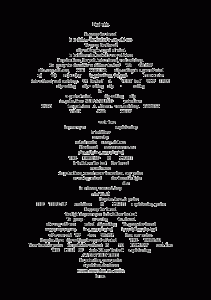
My piano students give me sour faces when I mention J.S. Bach. With good reason. Even his simplest pieces are deceptively difficult. The more advanced students grind their teeth when they have to tackle his fugues. They usually start out strong, but by the middle of the piece they have used up all their energy. I can feel their lead-weighted fingers going into spasms and the music would sag like a corpse being dragged to its final resting place.
There is a sense of playfulness in a fugue, where different voices “chase” each other, constantly morphing and colliding, appearing and disappearing. When Jack Foley talked to me about “multiplicity,” my mind went to the fugue, where a single entity spins and splits and manifests into different elements.
It must have been six months now since I told Jack I wanted to write a fugue—not a music composition, but a poem. Sometimes the brewing period does take that long. Friday (3/16) I sat down and wrote Fughetta (little fugue).
“I can’t help but think this is my break-through poem.” I told Jack.
He agreed.

I just want to go on record to say it’s a wonderful poem–and that I’m sure more wonderful poems will come from Clara Hsu. The Winter 2012 issue of Mary Ann Sullivan’s online Tower Journal (http://www.towerjournal.com) has an essay I wrote about Clara’s work. What she wrote on Friday, March 16 goes beyond what I wrote about there, but there are definitely connections. “Would that all God’s people were prophets,” wrote William Blake–or, at any rate, would that they all had the freedom, clarity and imagination to write as Clara does. This is, simultaneously, an art of vision and of listening. Fugue state!
P.S. There will be many “breakthrough poems.” The pot simmers!